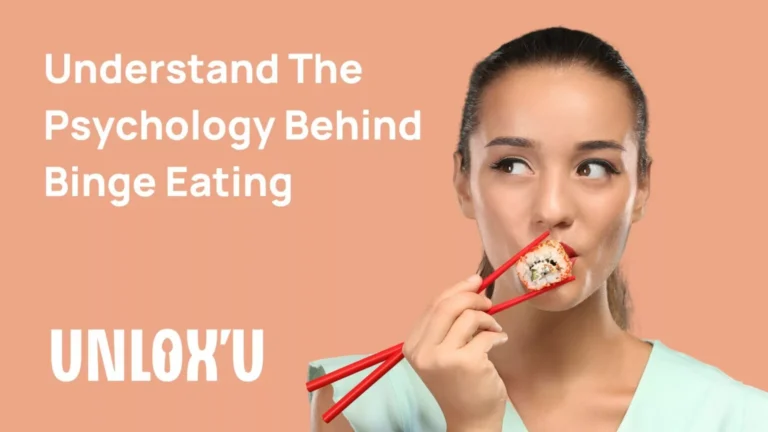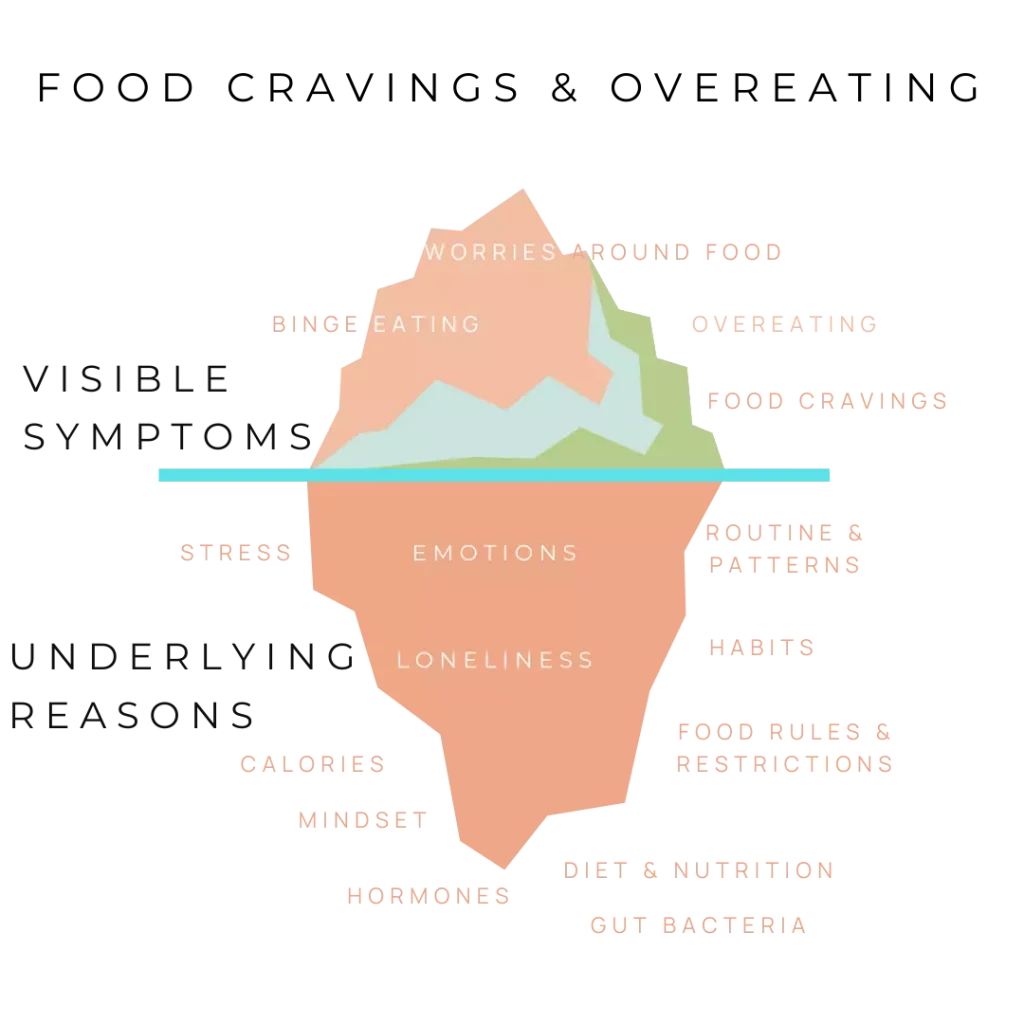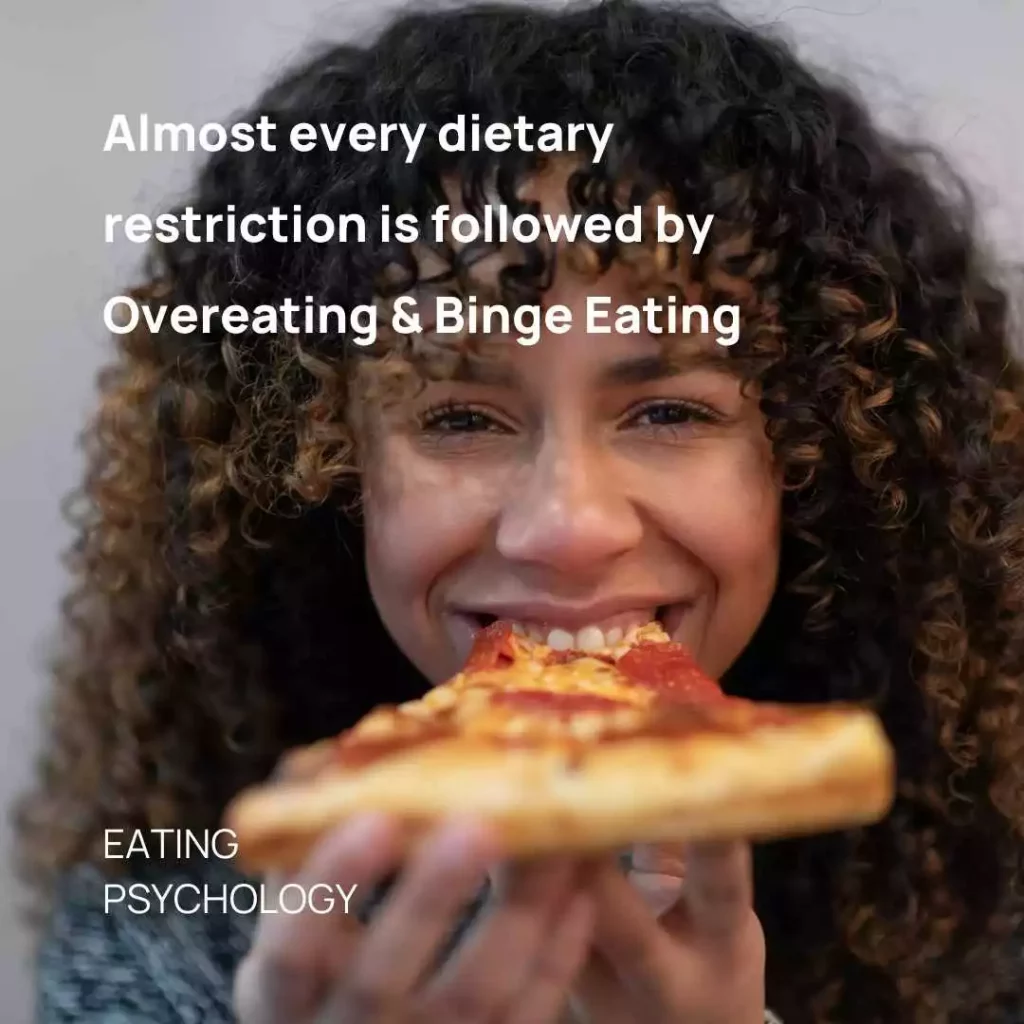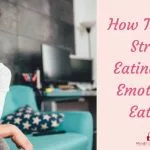
Understand The Psychology Behind Binge Eating
Understanding the psychology behind binge eating can help us get to the root cause of why we can’t stop eating, even when we are full. It also gives us deeper insights into the root cause of overeating, food cravings and what causes us to compulsively eat.
Often, when we feel out of control with food, we believe to be in control of food, we just need to be stricter, follow a diet plan and have stronger willpower.
This can’t be further from reality. In fact, this approach will make everything only worse.
I first, want to go into what NOT TO DO when you want to stop binge eating and why it creates more issues.
The psychology behind food rules – why we undereat
When we undereat, we often feel like we have control over our body and mind. By denying your body of its most basic need- nourishment- you feel a sense of strength because in a way you have “beat the system” by overcoming hunger, our most natural instinct.
The issue with this is, that the stronger the food restrictions, rules and strict regimes, the stronger the cravings for those foods. The more we focus on eliminating certain foods, or eating only at certain times, the more we will be thinking about food.
The more you try to “control” food, the more you will feel out of control.
It’s like your first crush on someone and they were not available for a romantic relationship. The more they ignore you, the more you want them. It starts becoming like an obsession.
This is exactly how we feel about food. We start obsessing over food, thinking about it as soon as we wake up, and planning the next meal while eating the current one.
When we want to stop binge eating, we need to remember not to focus on elimination, restrictions, food rules and diet plans.
We don’t get long-term accountability for consistency
We all start with the best intentions. Every day or every Monday, we promise ourselves it’s not going to happen again. Today will be a better day. However, life gets in our way. There is a moment when everything becomes too hard, food gets boring and days are too stressful. It might even end in the afternoon when the cravings kick in.
We have found that long-term support is the key to stopping binge eating. Having someone by your side who can help you to dig deeper into why you keep relapsing, what your triggers are and to help you develop new habits until they become automatic.
Missing the root cause of binge eating.
This point is probably one if not, the most important one.
Think about it like this:
would you take medication for your throat, if your foot was sore?
No, you wouldn’t right?!
But this is exactly what we do when we are trying to stop overeating and just get back to “normal” eating.
We don’t look where the issue is coming from and what exactly we need to do to treat that one specific root cause for our relationship with food.
Binge Eating is not about food.
Overeating, binge eating, and constant thoughts about food are NOT THE PROBLEM, they are SYMPTOMS AND MESSAGES. Binge Eating is often driven by our psychology, brain, gut biome, habits and eating patterns. When we explore the deeper level of our relationship with food and identify the root cause of our eating habits. Only then, we can address each of the key drivers and instigate change.

The root cause of why we binge eat
When working with clients, I keep seeing lots of patterns when it comes to eating habits. So far, I have identified 13 triggers that can lead to binge eating, food cravings and overeating.
To review all 13 binge eating triggers, download the free guide I have developed.

Don’t know why you can’t stop eating?
Download the FREE guide to find out which of the 13 underlying triggers lead you to crave food, overeat or binge eat.
Why you can’t stop eating – Let’s look into the brain.
Our brain is wired to seek pleasure/ reward and avoid pain. We will naturally seek out activities that create pleasure. Food stimulates the reward system in the brain which releases the feel-good hormone: dopamine. This is how we start feeling “addicted” to the way food makes us feel. Even just looking or thinking about food releases dopamine and drives our motivation to eat until this need is satisfied. This is why we can’t stop thinking about yummy food until it’s gone.
When you start thinking about food or had your first bite of that delicious cake, now, you are dealing with dopamine that makes you want to continue and eat more. The problem with this hormone is that it is not designed for us to feel satisfied. It’s a hormone that is designed for us to WANT MORE!!!
It makes you feel like…. If I have another biscuit, I will feel satisfied, if I have another piece of chocolate, that will give me the feeling I am looking for. But it’s a trap. It’s not dopamine’s role.
This is how we end up eating all sorts of food in the pantry until the stomach is hurting and still not feel like it hit the spot.
Being aware of how we respond to food and what drives our decisions, we can take the power back and regain control again.
How to stop binge eating by using the knowledge of the psychology of binge eating?
1. Understand the underlying need for your desire for food.
Ask yourself what you are truly longing for. Is it really food? Are you longing for comfort, rest, a break or are you just bored?
When we learn to identify the actual need and the message our body is sending us, we can finally create true and real satisfaction in our lives. If food was never the actual need (because you were not hungry in the first place), it’s hard to know when to even stop eating.
Often, the reason why we overeat is that there is a void inside of us that we are trying to replace with food. This would be the psychological reason for food intake. However, there could also be biological reasons such as undereating, or looking for a feel-good feeling through dopamine. Of course, there could also be physiological reasons such as imbalanced gut bacteria, hormones or even our current food choices.
2. Dopamine vs. serotonin.
Dopamine is a short lives hormone that makes us want more without ever feeling satisfied. On the contrary, serotonin is a long-lived hormone that gives us a sense of contentment. It’s that feeling when you feel so calm, that food becomes irrelevant until you are hungry. Even then… you won’t eat past comfort. You will automatically stop when you have had enough to eat.
Here are some suggestions to increase serotonin:
- Spend more time outside in fresh air
- Mindfulness and meditation
- Movement / Exercise
- Doing activities that are meaningful to you
- Beautiful memories that give you those fuzzy feelings
- Regular gratitude practice
- Self-care that makes you feel good.

3. Become a smart eater
As long as we are not eating enough, the right food, the right amount and balanced, it will be almost impossible to create a healthy and easy relationship with food. Our bodies will always try to find every opportunity to eat.
Food is the primary need for survival. It’s our instinct to eat to stay alive. When we either truly restrict food, or perceive a sense of scarcity, our brain starts believing it needs to look for every opportunity to find food. It starts going into overdrive to keep us alive. It doesn’t know that there is plenty of food in the supermarket or the pantry, it just knows that it is not available with ease.
4. Be aware of the addictive response of high palatable foods
Chocolate, chips, pizza, basically all your favourite foods are high palatable foods. They often have the “perfect” combination of sugar/fat/salt that makes it extra yummy. This combination sparks the reward system in the brain which gives a sense of euphoria.
No wonder we want more of it, even when we already feel good. There is always this want to feel even better than we are already feeling.
I suggest to keep these foods to a minimum in your diet and you will notice that you naturally crave less “junk food.” This will also help you to keep your gut bacteria healthy and balanced.
Especially, if you are struggling with regular chocolate and sugar cravings, you want to focus on wholesome food, healthy gut bacteria, and regular balanced meals.
Let’s conclude and summarise some action points.
- Understand the actual reasons and the underlying needs for your desire to eat apart from hunger.
- Focus on creating serotonin so you don’t rely on dopamine to make you feel good for a few minutes.
- Become a smart eater. Eat balanced, regular meals according to your calorie need.
- Get help who focuses on the psychology behind binge eating and can provide long-term and ongoing support.

Schedule your FREE Discovery Call
On this 60-75 minutes call, we will:
- Identify your challenges, your history and your goals.
- Assess the best approach to stop overeating, food cravings, binge eating and emotional eating.
- Create a plan to achieve your food and body goals in an effective and sustainable way.
- At the end, we will decide whether we are a good fit to work together to get you from where you are right now to where you want to be.



